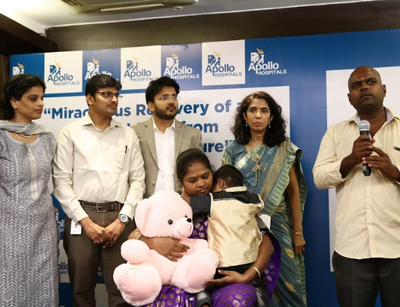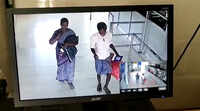
CHENNAI: Every organ in the three-year-old boy failed, and his family told doctors they did not have money for an emergency liver transplant to save his life. But the doctors weren’t ready to give up – they used high-end machines and medications to treat him with a Rs 12lakh fund they had crowdsourced.
When the boy --Radhesh -- came to the hospital for a review on Tuesday, he told reporters that he was excited about starting school. “I will grow up to be a cricketer,” he said smiling for cameras.
In April, Radhesh developed a high fever. His sugar levels rose, and he was unconscious. He was referred to Apollo Children’s Hospitals here.
In less than 12 hours, the doctors told the family that Radhesh’s liver had completely failed and he would require an urgent liver transplant. His parents broke down. His father, Varadarajan, who runs a transport company, told the doctors that he had just Rs 1 lakh he had borrowed for the child’s treatment.
“We told the doctors that we would take him back home because there was no way we could afford Rs 20 lakh for a new liver,” he said. But doctors promised to help. They used money that was left behind from donations for other children they had crowdsourced for initial treatment and also put out messages on social media through agencies to raise funds for the boy.
In a few hours, his liver condition worsened. The boy slipped into coma. Scans showed he had dangerously swollen brain and kidney failure. “He had no urine output and his blood clotting mechanisms failed. We were feared that he would die waiting for an organ,” said chief of paediatric ICU Dr Suchitra Ranjit.
By then the doctors had also made the diagnosis – it was a condition called fulminant liver failure. This led to build up of toxins in the liver. The condition causes brain swelling, affects heart, kidneys, pancreas, lungs and bone marrow besides inducing infections and disables body’ ability to clot blood.
Senior liver transplant surgeons who were consulted also recommended an immediate transplant. The doctors screened at least three living donors and two cadaveric donors for liver transplantation, but none of them suited Radhesh. From then on, the only aim for the doctors was to keep Radhesh alive till they find a new liver.
He was ventilated and placed on chemically induced coma to reduce brain pressure, while he received continuous brain monitoring.
“He was receiving circulatory support to normalise his BP and organ perfusion,” said Dr Vasanth Kumar. Nephrologists ensured continuous renal replacement therapy, a form of dialysis which removes toxins from the blood in addition to a complex liver support care.
Machine monitored his brain activity throughout. “All the while we thought these therapies although risky and invasive would keep him alive for transplant. Every morning we walk into the ICU hoping he would get a new organ,” said Dr Kumar.
Things changed on the sixth day of admission. “His liver which was totally damaged began to show signs of recovery. His brain swelling decreased, and kidney function improved,” said Dr Ranjit. He slowly recovered consciousness in the next two days and on the ninth day, he was weaned off all life support.
The hospital, meanwhile, managed to crowdsource money for the entire bill. “We told family he doesn’t need a liver transplant. He has recovered well. His organs are working well. His family has sent us a video of him playing his favourite game at home. His only fever now is the IPL,” she said.
When the boy --Radhesh -- came to the hospital for a review on Tuesday, he told reporters that he was excited about starting school. “I will grow up to be a cricketer,” he said smiling for cameras.
In April, Radhesh developed a high fever. His sugar levels rose, and he was unconscious. He was referred to Apollo Children’s Hospitals here.
In less than 12 hours, the doctors told the family that Radhesh’s liver had completely failed and he would require an urgent liver transplant. His parents broke down. His father, Varadarajan, who runs a transport company, told the doctors that he had just Rs 1 lakh he had borrowed for the child’s treatment.
“We told the doctors that we would take him back home because there was no way we could afford Rs 20 lakh for a new liver,” he said. But doctors promised to help. They used money that was left behind from donations for other children they had crowdsourced for initial treatment and also put out messages on social media through agencies to raise funds for the boy.
In a few hours, his liver condition worsened. The boy slipped into coma. Scans showed he had dangerously swollen brain and kidney failure. “He had no urine output and his blood clotting mechanisms failed. We were feared that he would die waiting for an organ,” said chief of paediatric ICU Dr Suchitra Ranjit.
By then the doctors had also made the diagnosis – it was a condition called fulminant liver failure. This led to build up of toxins in the liver. The condition causes brain swelling, affects heart, kidneys, pancreas, lungs and bone marrow besides inducing infections and disables body’ ability to clot blood.
Senior liver transplant surgeons who were consulted also recommended an immediate transplant. The doctors screened at least three living donors and two cadaveric donors for liver transplantation, but none of them suited Radhesh. From then on, the only aim for the doctors was to keep Radhesh alive till they find a new liver.
He was ventilated and placed on chemically induced coma to reduce brain pressure, while he received continuous brain monitoring.
“He was receiving circulatory support to normalise his BP and organ perfusion,” said Dr Vasanth Kumar. Nephrologists ensured continuous renal replacement therapy, a form of dialysis which removes toxins from the blood in addition to a complex liver support care.
Machine monitored his brain activity throughout. “All the while we thought these therapies although risky and invasive would keep him alive for transplant. Every morning we walk into the ICU hoping he would get a new organ,” said Dr Kumar.
Things changed on the sixth day of admission. “His liver which was totally damaged began to show signs of recovery. His brain swelling decreased, and kidney function improved,” said Dr Ranjit. He slowly recovered consciousness in the next two days and on the ninth day, he was weaned off all life support.
The hospital, meanwhile, managed to crowdsource money for the entire bill. “We told family he doesn’t need a liver transplant. He has recovered well. His organs are working well. His family has sent us a video of him playing his favourite game at home. His only fever now is the IPL,” she said.
#ElectionsWithTimes
more from times of india cities
Elections 2019

Trending Topics
LATEST VIDEOS
More from TOI
Navbharat Times
Featured Today in Travel
Quick Links
Lok Sabha Election Schedule 2019Lok Sabha Election NewsDelhi Capitals teamMI team 2019Rajasthan Royals 2019RCB team 2019Maharashtra Lok Sabha ConstituenciesBJP Candidate ListBJP List 2019 TamilnaduShiv Sena List 2019AP BJP List 2019Mamata BanerjeeBJP List 2019 MaharashtraPriyanka GandhiBJP List 2019 KarnatakaAMMK Candidate List 2019BJP List 2019 WBLok Sabha Elections in Tamil NaduBSP List 2019 UPNews in TamilLok Sabha Poll 2019Satta Matka 2018PM ModiMahagathbandhanNagpur BJP Candidate ListChandrababu NaiduTamil Nadu ElectionsUrmila MatondkarNews in TeluguMadras High CourtTejashwi YadavArvind KejriwalTejasvi SuryaPawan KalyanArvind KejriwalYogi AdityanathJaya PradaSatta King 2019Srinagar encounter
Get the app









